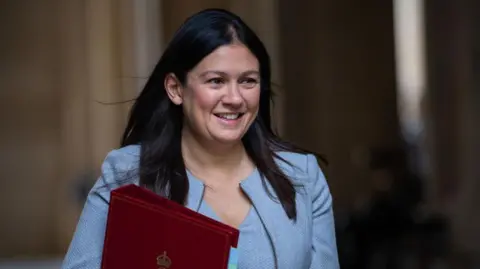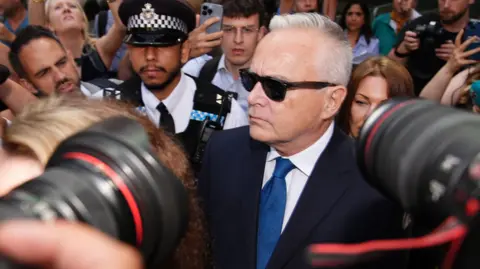Lisa Nandy presses BBC boss over disgraced star’s pay

 Getty Images
Getty ImagesCulture Secretary Lisa Nandy has said she had a “very robust and frank discussion” with the BBC’s director general over its handling of the Huw Edwards scandal, including how licence fee payers’ money was spent on the former BBC News presenter’s pay.
Ms Nandy held talks with Tim Davie on Thursday, the day after Edwards pleaded guilty to three counts of making indecent images of children.
The BBC continued to employ Edwards, formerly the BBC’s most high-profile newsreader, for five months after he was arrested, during which time he was paid £200,000.
In an interview with BBC News on Thursday, Mr Davie said the corporation had taken “difficult decisions in a fair and judicious manner”.
Ms Nandy told BBC News: “We had a very robust and frank discussion about the circumstances around the case, and some of the decisions that have been made during that case and since.
“Obviously I am particularly concerned to make sure that people have confidence in the BBC.”
She said Mr Davie had “made a good start yesterday” in being “as open and transparent as possible” about what the BBC knew and why he made the decisions he did.
She also said the “use of taxpayers money” was “obviously important to a lot of people”.
She added: “My concern is to make sure warning signs are caught, complaints are acted on, public money used well, and to make sure as far as humanly possible, we don’t have a repeat of this situation in the future.”
‘Questions to answer’
Ms Nandy told BBC Radio 5 Live: “There are questions, though, that many people have asked about whistleblowers for example.”
She added that there were also “questions about the contractual arrangements that the BBC has and whether it’s appropriate if people are suspended, particularly once they’ve been arrested, to continue to receive not just full pay but also to see an uplift in that pay”.
She said: “The BBC is funded by the licence fee, people who don’t have a huge amount of money right now are digging into their pockets to make sure the BBC can not only survive but thrive.”
Following her talks with the director general, a spokesperson for the Department for Culture, Media and Sport said the culture secretary was “shocked by Huw Edwards’ abhorrent actions, and her thoughts are with the victims whose lives have been destroyed”.
 PA Media
PA MediaEdwards was suspended by the BBC in July 2023 following separate allegations in the Sun newspaper. He was then arrested in November on the charges that he has now pleaded guilty to.
He resigned this April, which the BBC said at the time was on “medical advice”.
He received between £475,000-£479,999 between April 2023 and April 2024, an increase of £40,000 on the previous year. Mr Davie said the pay rise dated from before any allegations.
He said it was “legally challenging” to recover any of the pay, but said he would “look at all options”.
He also said it would be “nigh on impossible” for the BBC to claw back his pension.
On Thursday, Conservative former Culture Secretary John Whittingdale told the BBC’s Newsnight there was “an impression that the BBC has not sought to be as transparent as they should be” over the whole matter.
“I think we need to know much more about why it was came to the conclusion that he [Edwards] should go on receiving his salary, that he should be allowed to resign rather than be sacked, and why the BBC knew about his arrest, and yet we only discover it eight months later,” Mr Whittingdale said.
The Metropolitan Police told senior BBC managers about the arrest in “strict confidence” in November.
Asked how much he was told at the time, Mr Davie said: “We knew it was serious, we knew no specifics, apart from the category of the potential offences.”
BBC bosses were not aware of the ages of the children in the images.
Asked why Edwards could not have been sacked at the time of his arrest, Mr Davie replied: “Because the police came to us and said they need to do their work in total confidence, [and said], ‘please keep this confidential’.”
Edwards had not been charged at that point and it was still possible he would be cleared, Mr Davie noted.
“We thought long and hard about this. This wasn’t a kneejerk decision. When you think about this in terms of precedent, people do get arrested, and then we’ve had situations where [there are] no charges, and there’s nothing there to be followed up on.”
He said the corporation also had to consider its duty of care to Edwards.
After being arrested last November, Edwards was charged in June. In a statement on Wednesday, the BBC said he would have been dismissed had he been charged while still employed.
Edwards admitted having 41 indecent images of children, which had been sent to him by a convicted paedophile, Alex Williams, on WhatsApp.
They included seven category A images, the most serious classification – two of which showed a child aged between about seven and nine.
Source link





